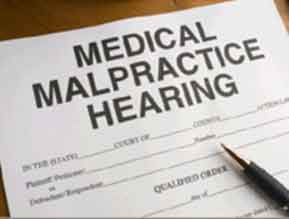Why a Timely Multiple Sclerosis (MS) Diagnosis is Crucial from New York Medical Malpractice Lawyers

While all medical conditions require accurate and timely diagnoses, patients with multiple sclerosis (MS) can miss out on critical early treatments when doctors are too slow in determining what’s causing their symptoms. In fact, once MS progresses beyond some of its most common early signs, patients may be unable to obtain as many long-term remissions.
To help patients minimize their suffering, basic neurological tests have been developed to help doctors gain conclusive evidence about the presence or absence of MS. Hopefully, the standard and emerging tests and treatments referenced below will help you or someone you know regain greater control over daily activities once they’re properly employed – in conjunction with thorough office exams and carefully reviewed medical histories.
Here is some helpful information about the exact nature of multiple sclerosis, it’s most common signs and symptoms, other ailments that can mimic MS, standard tests run to detect its presence – and a brief look at some of the treatments currently available or being developed.
What Exactly Is Multiple Sclerosis?
It’s a progressive neurological disease that can cause profound challenges for those who must live with it. Perhaps it’s best explained by first noting that we all have a central nervous system that contains a vast number of nerve fibers. Every day, these fibers constantly send intricate messages between our brains and spinal columns. Normally, each nerve fiber is covered with a substance called myelin sheath.
However, when this nerve fiber covering is attacked or damaged by a disease like MS, the person’s nerve impulses can slow down or stop altogether – often causing them painful or compromising neurological problems.
Patients and their doctors frequently begin to question the presence of MS — or another similar illness — when they start experiencing a few of the following symptoms:
- Fatigue
- Dizziness
- Double vision that often won’t go away
- Numbness or weakness in one or more limbs (often accompanied by an unsteady gait)
- Slurred speech
- Painful sensations whenever their necks are extended forward, and
- Difficulty in controlling bladder or bowel movements
Those who experience one or more of these symptoms should immediately report them to their primary care doctors – they should then obtain thorough medical histories from these patients and refer them on to specialists.
Once you visit a neurologist, that doctor will need to first rule out other diseases that can cause MS-like symptoms.
Other Medical Conditions Sometimes Mistaken for MS
The National MS Society website states that some of the following illnesses can produce symptoms like those common to multiple sclerosis.
- Lyme disease
- Collagen-vascular diseases
- AIDS, and
- Various – though rare – hereditary disorders
As multiple sclerosis experts will tell you, pinpointing your precise condition at an early stage can prove crucial – since some types of multiple sclerosis only respond well to currently available treatments when caught in their early stages. Your doctor will need to help you carefully rule out the conditions referenced above – by ordering the most appropriate tests.
Some of the Most Useful Tests Run to Discern – or Rule Out – Multiple Sclerosis
- Blood tests. Your doctor will be looking for “biomarkers” frequently found when MS is present in a person’s body;
- An MRI. This imaging of your brain helps doctors look for “lesions” (specific types of spots) that can indicate the presence of the disease. You will usually be given an IV (intravenous injection) of a dye or “contrast material” so that any lesions will be clearly highlighted. Your doctor will then examine them closely to see if they’re in an “active” phase – which helps determine the current most appropriate treatment;
- A lumbar puncture. While spinal taps are rarely pleasant, this effort to remove fluid from your spinal column will be handled as painlessly as possible. Your doctor will look at this fluid to see if any MS antibodies are present. As one government website notes, “antibodies may be produced when the immune system mistakenly considers healthy tissue a harmful substance. This is called an autoimmune disorder.” The lumbar puncture test can be quite useful when trying to rule out other diseases that produce symptoms like those common to MS;
- Evoked potential tests. These involve using different visual or electrical stimuli to study the responses of your nervous system. The electrodes used help measure how fast your body can send messages down different nerve pathways.
Once your doctor reviews these tests results, along with your detailed medical background and any office physical exam results – he should be able to determine if you have multiple sclerosis. You should also be told if you are suffering from relapsing-remitting MS – or another form of the disease – so that you can obtain the most appropriate treatment.
If you have sought out treatment at an early stage and found a highly qualified MS expert to treat you, there’s every chance that you can use one or more of the following treatments to stay in command of your health in the future.
Current and Emerging Treatments for MS
While there is no current cure for MS, you can still often benefit from one or more disease-modifying therapies (DMTs) for your central nervous system disease. At present, there are just thirteen (13) DMTs approved for MS by the Food and Drug Administration. Fortunately, they help about 85 percent of people – to one extent or another.
If you cannot find a standard treatment that helps you, consider taking part in some of the many ongoing clinical trials that offer a variety of new drugs like Zenapax and Rituxan.
If you did not receive a timely diagnosis of MS and have suffered through lengthy treatments for the wrong illnesses or conditions, you may need to contact your New York medical malpractice lawyer to discuss whether you should file a failure to diagnose lawsuit.



